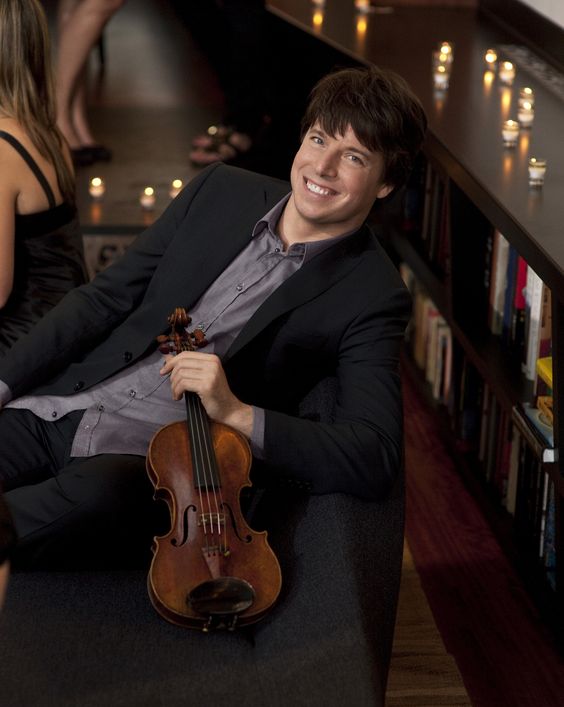Joshua Bell opens Kennedy Center residency with a tribute to JFK

Joshua Bell performed a recital Friday night at the Kennedy Center.
The Kennedy Center has been marking the 100th anniversary of its namesake’s birthday since last May. Programming here and there has had tributes to President John F. Kennedy shoehorned in, none all that compelling so far.
The first genuinely thoughtful example came with violinist Joshua Bell recital Friday night, which opened his week-long residency. American composer Aaron Jay Kernis created his Air for violin and piano as a tribute to Bell’s sound on the violin, but with an intriguing tweak it also served beautifully as a way to remember JFK.
Actor John Lithgow opened the second half with a moving recitation of Alan Seeger’s poem “I Have a Rendezvous with Death.” Just as the poet’s lines seemed to foreshadow his own untimely demise in World War I, the young president’s admiration of the same lines seemed prescient after his assassination. With such thoughts resonating in the air, Bell turned his signature dulcet tone to Kernis’s elegiac melodic writing, supported ably by the self-effacing pianist Sam Haywood in the piece’s Coplandesque harmonies. After a more turbulent middle section, riven by strident dissonance, the E string of Bell’s 1713 Huberman Stradivarius glowed in the tender solo cadenza. That stunning high playing, in a perfectly sighed flute-like timbre, is Bell’s greatest asset, and few can compete with him.
Bell’s first half was in the same serious vein, opening with Beethoven’s Violin Sonata No. 1. Bell and Haywood pressed the first movement tempo, one way to compensate for the shortcomings of this early work. Both performers excelled in the light, fluffy second theme in this movement, allowing the pace to relax a notch or two. Haywood’s strength as an accompanist, making transparent piano textures to hang around his soloist, was an asset especially in the second movement. Coordination and fitful intonation issues cropped out throughout the evening, possibly a result of the extreme temperature swings on the past week, affecting the piano’s strings. In the finale the duo struck a pleasant balance between sheer velocity and bubbly grace.
A Brahms set featured two of that composer’s best scherzo movements. The standalone Scherzo in C Minor, made for the collaborative F-A-E Sonata, came off as the wild ride it was intended to be, powered by stampeding triplets in the piano. The scherzando third movement of the composer’s Third Violin Sonata was even better, given an outstanding delicacy by both performers. The slow movement was just as lovely, without the snarl you might hear from other performers on the impassioned double stops. The first movement did not really smolder the way it could, yet the booming pedal point that builds toward the ultimate conclusion in the coda of the first movement was a high point. Both held back the intensity of sound in the finale, too, preserving strength for the end by not giving away the store too early. It was somewhat polite, soft-spoken playing for Brahms.
The musicians offered no bonuses at the end of the concert, but the last three pieces printed in the program were offered as quasi-encores. Bell played Eugène Ysaÿe’s Third Solo Violin Sonata at his 2012 recital here, when he also played the Brahms Third Sonata. Then he explained his connection to this piece, which was premiered by Josef Gingold, who was Bell’s teacher at Indiana University. Bell did not produce the same Mephistophelian shiver this time around, with sonorous double-stops but a more restrained approach to the virtuosic flourishes.
Bell took Rachmaninoff’s famous Vocalise, a specialty piece for him, at quite a clip, seeming almost embarrassed to wallow too much in its beauties. Sarasate’s unabashedly showman-like Carmen Fantasy provided the big finish, especially when Bell was again high on the E string, as in the flageolet variation in the first movement. The tone on the G string was equally beautiful in the “Habanera,” but without much seductive heat, while the pyrotechnics in the challenging “Seguidilla” proved astounding. After the thrilling accelerando in the last movement, there was indeed no need for an encore.
Continuing his residency at the Kennedy Center, Joshua Bell will conduct and play with the National Symphony Orchestra 8 p.m. Saturday and lead an NSO family concert 2 p.m. Sunday. kennedy-center.org; 202-467-4600.
